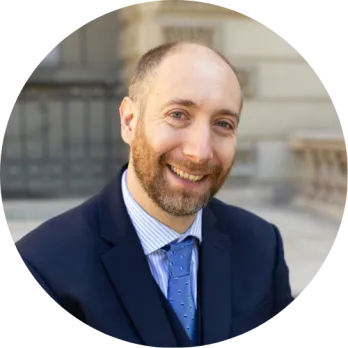UCT launches African Hub for AI Safety, Peace, and Security

Associate Professor Jonathan Shock, the interim director of the UCT AI Initiative.
Image: UCT
The University of Cape Town (UCT) recently officially opened the doors to the African Hub on AI Safety, Peace, and Security, a revolutionary platform aimed at embedding African perspectives into the global discourse on artificial intelligence (AI) safety.
This historic initiative signals a determined effort to ensure that the rich tapestry of African experiences and aspirations plays a pivotal role in shaping the future of AI.
“This hub is about more than science – it’s about societal impact,” said Associate Professor Jonathan Shock, the interim director of the UCT AI Initiative. “Our aim is to ensure Africa’s priorities are represented in global AI debates while advancing research, building capacity, and influencing policy.”
The launch ceremony, which drew a distinguished audience of students, academics, international partners, and dignitaries, featured opening remarks from key figures including UCT Vice-Chancellor Professor Mosa Moshabela, Emily Middleton from the United Kingdom Department of Science, Innovation and Technology, and Maggie Gorman Vélez from Canada’s International Development Research Centre.
In his address, Professor Moshabela described the establishment of the hub as both a proud milestone and a significant responsibility for UCT. “We are not only launching a hub, we are affirming our role in leading Africa’s contribution to the future of AI safety. At UCT, our mission is rooted in research, teaching, and societal engagement – this initiative speaks to all three,” he said.
“By anchoring the hub here, we are making it clear that Africa’s voice matters, that Africa’s knowledge matters, and that its future in AI must be secured on its own terms. We must ensure that AI tools are developed in a responsible and inclusive manner.”
Middleton emphasised the necessity of African influence in AI development, noting that despite the continent's disproportionate exposure to AI-related risks, African voices remain underrepresented in shaping these crucial systems. “We must confront challenges like the digital divide, tech-enabled gender-based violence, and training data that does not reflect Africa’s needs,” she said, establishing the hub as a vital centre for Africa-led research that holds global significance.
Vélez highlighted the burgeoning international movement surrounding this hub, noting it is part of a network of 13 multidisciplinary labs worldwide under the AI for Development programme.
“Global collaboration on AI yields benefits for all nations, and we are proud to partner with UCT and the Global Centre on AI Governance to ensure Africa’s priorities are represented effectively on the global stage,” she said.
In a landscape often dominated by external narratives, Associate Professor Shock called attention to the pressing issues of AI safety that are unique to African contexts. “While existential risks are a focus in many discussions, the peace and security ramifications of AI on African societies are equally pressing,” he explained. He pointed to urgent challenges such as disinformation during elections and AI-driven surveillance, all of which demand immediate research and attention.
With a vision set over the next three years, the hub will hone in on research, strengthening local capacities, and influencing AI policy. Partnerships with established networks like Masakhane, Deep Learning Indaba, AfriClimate AI, GRIT, and CAIR will enhance their outreach and impact.
AI holds transformative potential across various fields, including agriculture, healthcare, education, and democracy, if applied responsibly. Shock painted a vivid picture of AI's possibility: “In agriculture, for instance, satellite imagery combined with local weather data can assist smallholders in protecting their yields. In healthcare, we can create low-cost diagnostic tools that save lives. In education, AI can provide personalised tutoring, and in democracy, it can flag disinformation in local languages to preserve election integrity.”
Dr Chinasa Okolo, founder of Technecultura, passionately urged for a reframing of AI safety from an African viewpoint, advocating for multilingual evaluation systems and regional infrastructure investments that prioritise public participation in AI governance. “Mainstream AI safety has been dominated by Western-centric approaches that often exclude the lived realities of the Global South,” Dr Okolo remarked, underscoring the necessity of inclusive frameworks in global AI safety initiatives.
Associate Professor Shock concluded with an optimistic vision for the hub’s future. “Five years from now, I hope we’ll have a network of African innovators building tools that address risks while advancing peace, democracy, and development across the continent. This initiative is not just about AI; it’s about crafting a new narrative for Africa in the technological landscape.”
Related Topics: